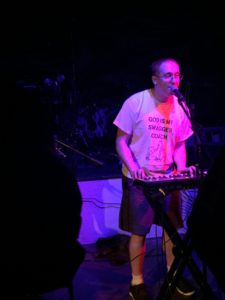By: Jess Ward, Staff Writer
On Thursday, Sept. 21, Portland’s Space Gallery was home to the experimental art rock group known as Xiu Xiu. Featuring two of its members that night, Shayna Dunkleman on percussion and synthesizer, and Jamie Stewart on vocals, guitar and cymbal, the group is known for its abstract and unique sound. Often angry and deeply sad, Xiu Xiu uses visceral emotion to orchestrate seemingly chaotic noise into music.
Upon arriving at the Space Gallery’s Xiu Xiu show, it seemed that the opposite tone had taken over the room. The era of passionate young punk rockers appeared passed; the benches lining the walls were full of phone-watching silent spectators, undoubtedly scrolling through their feeds and checking their emails. It’s a story told a thousand times: teenagers and young adults unable to break the hold social media has on them. The floor space itself was empty, with the exception of one balding man drunkenly flirting with the woman next to him. It isn’t what one would expect at such an alternative and progressive concert, and yet, it is undoubtedly predictable. The metaphorical clock ticked on, the suspense of waiting for the music dissipated by the evident apathy prevailing in the venue.

Then, seemingly out of thin air, a keyboard rings out. The drunk man laughing and guffawing with the woman at the show was an opener, in his band Mr. NEET. His name is Joel Glidden, and he performs with fellow musician Nigel Stevens. The two are philosophy students, which influences their musical themes, which include religion, politics and, most importantly, alcohol. They describe themselves as “synth-pop-punk-kind-of,” and their sound is reminiscent of The Flight of the Conchords, New Zealand comedians whose songs are drenched in satire. While performing, the pair are throwing back beer, and getting progressively sloppier and energetic. The crowd responds enthusiastically, as people slowly begin to feel less self-conscious and more amused. Glidden confesses that not every show goes as well, but at the “good ones people dance,” and that’s clearly the case as a couple of people began enthusiastically jumping and fist-pumping along with the music.
One of these amused participants is Sebastian Shanes, teenager and frequent concert-goer in the Portland area. Shanes says that he’s here just because “it’s something to do on a Thursday night.” When asked how he finds the courage to dance in a room full of mostly still spectators, Shanes admits that there’s always some hesitancy at first, but that music is “freeing, and clears the mind of chaos.” He cites this as his source of bravery and reason for dancing. As the show continues, it is clear that not all of the fellow audience members feel just as liberated.
The moment arrives as Xiu Xiu steps on stage, Stewart and Dunkleman both calm and professional as they set up, the audience silent in anticipation. They open with their song “Dear God, I Hate Myself,” a piece centered around the struggle of mental illness and self-loathing. The set goes on, as Stewart’s voice achingly rings out and Dunkleman’s precise percussion skills and timing carry a strong rhythm through the air. The pair were panting and sweating, their performance full of vigor and movement. Dunkleman appears to almost fly in the air, jumping and banging her instruments with pure enjoyment. Stewart seems more serious, but just as passionate, as his songs continue to touch on sensitive and personal topics. The crowd is amazed as he lays everything bare: his emotions, insecurities, sadness. By the time Xiu Xiu played their last song, the room felt electric and alive, quite opposite of how the night began.
Stewart says that his music is inspired by “barnyard animals and the ugliest possible sounds,” and that he writes most of it under the influence of various substances. He laughs a lot, and finds the idea of analyzing his music humorous. When asked how he wants the audience to feel when watching his profoundly personal and raw performance, he says only that “it’s not any of my [his] business, and I can’t control the reactions of others.” He does, however, admit to some kind of stage fright, commenting that he “keeps his head down and his eyes shut for a reason.” It’s understandable why Stewart wouldn’t want to watch the reaction of the crowd. However, everyone in attendance seemed to be in awe of his honesty. The music centered around ideas like loneliness, anger, depression and love. When Xiu Xiu stepped off the stage, there wasn’t a phone in sight.
Perhaps punk rock and the emotions that come with it aren’t dead, just reborn. As the crowd watched reverently as Stewart cried into his microphone, sweat pouring down his face and body, begging to be heard, it was clear that the truth in music will persist even in the age of apathy.

